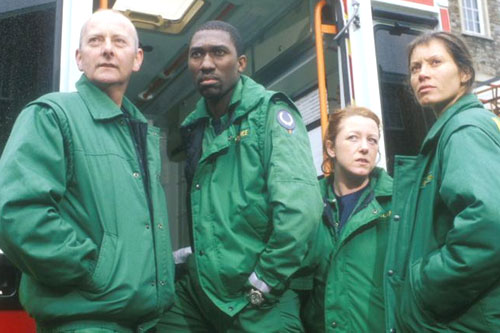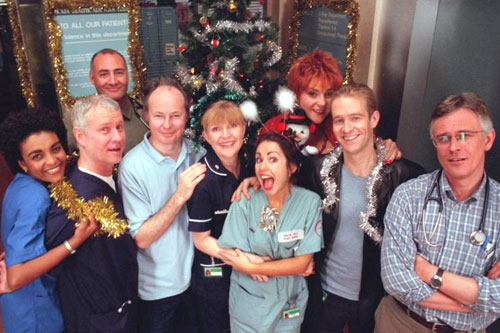25 years strong: the idea that defined Casualty
Paul Unwin and Jeremy Brock
7 September, 2011
We met at Bristol University, in 1979, where we were both studying drama.
We then went on to work together in the theatre, when Paul directed Jeremy’s play In Times Like These for the Bristol Old Vic.
Both of us had spent time in hospital – Jeremy after illness and Paul after an accident – and although neither of us had worked in TV, we were really excited by it as a medium.

Some of the Casualty cast from 2000 - Josh, Finlay, Mel and Penny
We shared a love of American shows like MASH and Hill Street Blues, both of which had demonstrated a thrilling use of multi-strand storylines and a free-wheeling movement between drama and comedy.
Having both spent time in hospital, we were deeply concerned by what we saw as the Thatcherite attack on our National Health Service.
We knew just how unique the NHS was, how hard the staff worked, the incredible pressure they were under.
In 1985 it felt like all that good work was about to be dismantled. We were determined to make a stand.
Passionate, over-confident and sure of our political agenda, we wrote a pitch document that set our drama in the world of A&E.
From the very beginning, we defined this department as the frontline in the battle for the soul of the NHS. Looking back, that single idea defined the series.
It put the nurses at the centre, it demanded multiple storylines and it embraced scenarios that ran from the comic to the tragic, from the familial to the political.
Casualty was born.

The cast celebrating the millennium
To our complete amazement, we were commissioned.
Aged 25, with zero experience of writing television drama, we were suddenly faced with creating characters and storylines that would hold a BBC One audience on primetime.
We knew we wanted to get away from the cosy world of Angels, the 1970s drama about hospital nurses.
We knew we wanted to tell stories that had the political issues of the NHS at their heart and we knew we wanted to present the staff as fully rounded human beings, with all their strengths and faults on show.
But how to put all that together?
Our biggest challenge was lack of experience.
We needed to ally our energy and ambition to people who could help and guide us through the frantically fast development of those early scripts.
Two key figures stood out.
Early in our research, we’d met a charge nurse working nights at the Bristol Royal Infirmary. Peter Salt was an object lesson in calm.
He dealt with the throbbing, real life drama of the casualty department with a grace and wit that was intrinsically British and heroic all at once.
We saw him navigate his vulnerable patients through grief, recovery, folly and all the myriad scenarios that make up a night in A&E.
Charlie Fairhead is not Peter, and he is not Charlie, but his inspiration is buried deep in the values that drive Charlie’s feet-firm integrity.
Many weekends were spent around a kitchen table with Peter, while we suggested storylines that were increasingly outlandish, if not medically impossible.
Smiling gently, Peter would nudge us towards a better idea.
He became the series’ medical advisor.
25 years on, he remains Casualty’s touchstone for all medical issues.
The other key figure, in those early days, was the producer Geraint Morris.
A charming, passionate and life-loving Welshmen, he set the tone for the show.
With experience of helming classic series like Softly Softly and The Onedin Line, he knew how to create a family of characters that would generate the loyalty and emotion that our more political agenda sometimes missed.
What he knew, instinctually, we had to learn. He was a patient and affectionate teacher.
His great skill was in managing to make the production feel special and owned by everyone who worked on it.
That infectious enthusiasm has never been lost.
The series may have grown more sophisticated, the cast may have expanded, but at heart, Casualty is still about a family of characters battling it out on the frontline of the NHS.
25 years on, with the government threatening even greater cuts than in the 1980s, Casualty seems more pertinent than ever.
That a show can still feel relevant after so many years gives us a sense of real pride.
Original article on BBC TV Blog

